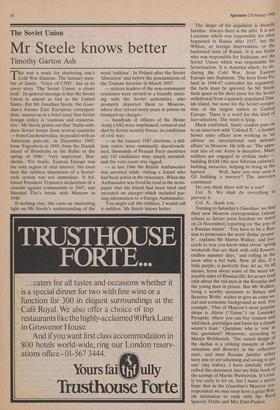The Soviet Union
Mr Steele knows better
Timothy Garton Ash
This was a week for shattering one's Cold War illusions. The January num- ber of Sanity, 'Voice of CND', has as its cover story 'The Soviet Union: a closer look'. Its general message is that the Soviet Union is almost as bad as the United States. But Mr Jonathan Steele, the Guar- dian's former East European correspon- dent, assures us in a brief essay that Soviet foreign policy is 'cautious and conserva- tive'. Mr Steele points out that 'Stalin with- drew Soviet troops from several countries — from Czechoslovakia, in parallel with an American pull-out, in December 1945; from Yugoslavia in 1945; from the Danish island of Bornholm in the Baltic in the spring of 1946.' Very important, Bor- nholm. 'For Stalin, Eastern Europe was the only region of vital interest, but even here the ruthless imposition of a Soviet- style system was not immediate. It fol- lowed President Truman's declaration of a crusade against communism in 1947, and Marshal Tito's break with Moscow in 1948.'
If nothing else, this casts an interesting light on Mr Steele's understanding of the word 'ruthless'. In Poland after the Soviet 'liberation' and before the proclamation of the Truman doctrine in March 1947: — sixteen leaders of the non-communist resistance were invited to a friendly meet- ing with the Soviet authorities, who promptly deported them to Moscow, where they served many years in prison on trumped-up charges; — hundreds of officers of the Home Army (AK) were imprisoned, tortured and shot by Soviet security forces, in conditions of civil war; — in the January 1947 elections, a mil- lion voters were summarily disenfranch- ised, thousands of Peasant Party members and 142 candidates were simply arrested; and the vote count was rigged; — in late 1946 the British Ambassador was arrested while visiting a friend who had been active in the resistance. When the Ambassador was freed he read in the news- paper that his friend had been tried and executed on charges which included pas- sing information to a foreign Ambassador.
You might call this ruthless. I would call it ruthless. Mr Steele knows better. The shape of his argument is drearilY familiar. Always there is the alibi. It is not Leninism which was responsible for what happened in Russia after 1917, but the Whites, or foreign intervention, or the backward state of Russia. It is not Stalin who was responsible for Stalinism; not the Soviet Union which was responsible for Sovietisation. It is America which, by de- claring the Cold War, froze Eastern Europe into Stalinism. The facts from Po- land in 1944-47 contradict his argument; the facts must be ignored. So Mr Steele finds space in his short piece for the Soviet withdrawal from a sparsely populated Dan- ish island, but none for the Soviet occupa- tion of the largest nation in Central Europe. There is a word for this kind of fact-selection. The word is lying. Much conforted, Sanity readers pass on to an interview with 'Colonel X.', a former Soviet army officer now working as 'an adviser on international and defence affairs' in Moscow. He tells us: 'The appa- rent size of our Army is deceptive. ManY soldiers are engaged in civilian tasks — building BAM (the new Siberian railway), building nurseries, helping to bring in the harvest. . . Well, have you ever seen a GI building a nursery? The interview continued: Do you think there will be a war? Col. X. We shall do everything to prevent it.
Col. X., thank you. • Turning. to Saturday's Guardian, we find their new Moscow correspondent (whose tribute to Soviet press freedom we noted on 24 November) reporting on 'the joys of a Russian winter'. 'You have to be a Rus- sian to pronounce the word 'dacha' proper- ly', explains Mr Martin Walker, and pro- ceeds to wax you-know-what about 'spring weekends that are thick with wild flowers, endless summer days,' and rolling in the snow after a hot bath. Now all this, if a little purple, is perfectly fine: let us, by all • means, learn about some of the more en- joyable sides of Russian life; let us not read only about the old men in the Kremlin and the young men in prison. But Mr Walker, being a worthy successor to Sidney and Beatrice Webb, wishes to give us some so- cial and economic background as well. For example, 'One of Moscow's most popular Shops is Alyen ("Game") on Leninsky Prospekt, where you can buy venison and wild duck, partridges and hares for a classic winter's feast.' Question: who is 'you' in this quotation? Moreover, according to Martin Webbovich, 'The varied design Of the dachas is a striking example of indi- vidualism and diversity in the collective state, and most Russian families either have one or are scheming and saving to get one' (my italics). I have carefully trans- cribed this statement into my little book of the sayings of Martin Webbovich. It's real- ly too early to let on, but I nurse a secret hope that in the Guardian's Moscow cor- respondent we may soon have a great Brit- ish institution to rank with the Revd Spacely-Trellis and Mrs Dutt-Pauker.










































 Previous page
Previous page